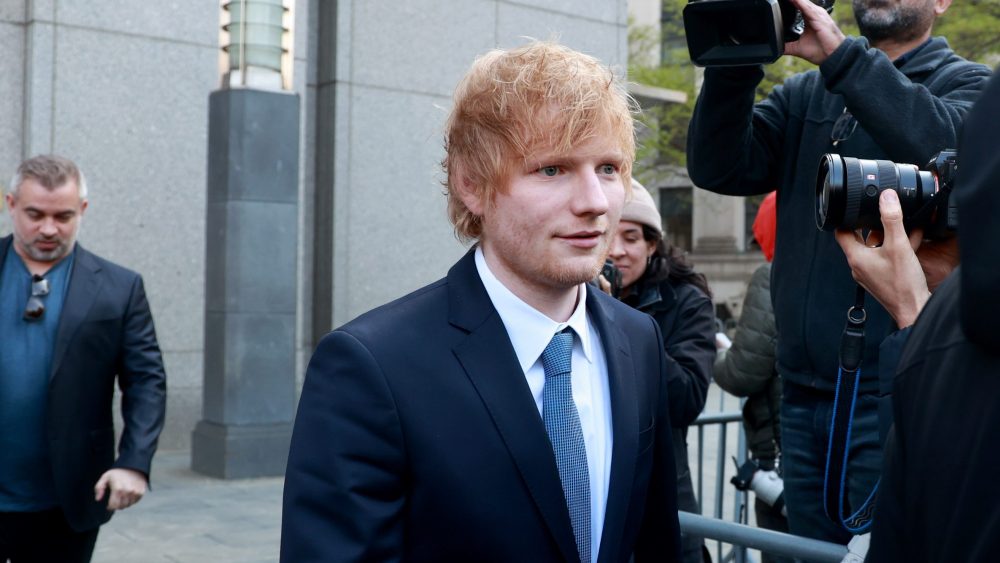Ed Sheeran Trial Goes Into Deliberations After Closing Statements
Testimony wrapped up in the Ed Sheeran copyright infringement trial at the end of the court day Wednesday, as the judge sent the Manhattan jury into deliberations with a pointed admonition: “Independent creation is a complete defense, no matter how similar that song is.”
U.S. District Court Judge Louis Stanton’s instructions may have left a high bar in the jury’s minds for just how much evidence the plaintiffs’ attorneys needed to have established to prove that Sheeran and his co-writer actually copied Marvin Gaye’s “Let’s Get It On” when they wrote the pop hit “Thinking Out Loud.”
According to Insider, Stanton told jurors that the lawyers for the heirs of Gaye’s co-writer, Ed Townsend, needed to “prove by a preponderance of the evidence… that Sheeran actually copied and wrongfully copied ‘Let’s Get It On’” — as opposed to the coincidental, negligible similarities argued by Sheeran’s attorneys.
Even though the clock had passed 5 p.m., the judge asked jurors to immediately begin discussing the case behind closed doors, saying that “it’s good for them to get a little bit of deliberations in” and reassuring everyone involved that “we’re not going to spend the night.” The jurors’ time together lasted well under an hour before they were dismissed and asked to return Thursday morning.
In closing arguments, Sheeran attorney Ilene Farkas referred back to the other side’s contention that the singer’s concert mashup of the two songs constituted “a smoking gun” and “a confession.” Said Farkas, according to the New York Post, “He did a mashup one night. That’s a plaintiff’s confession, their smoking gun?… Simply put: the plaintiff’s ‘smoking gun’ was shooting blanks.”
“Not only do we have a smoking gun, but we have bullets for that smoking gun,” said Ben Crump, an attorney for the plaintiffs, as both sides did their best to thoroughly exhaust the metaphor.
There were amusing moments during the closing day of testimony, news accounts suggest. After Sheeran had previously said in court that “Thinking Out Loud” was more akin to Van Morrison’s style than the Gaye tune, the comparisons got less cool on Thursday, as a debate erupted over a different song that had several different versions played in the courtroom: the fluffy 1960s hit “Georgy Girl.”
Dr. Lawrence Ferrar, an expert musicologist called by Sheeran’s team to counter one brought in earlier by the plaintiffs’ lawyers, said that “Georgy Girl” shares a similar chord progression and “anticipated” rhythm with both “Let’s Get It On” and “Thinking Out Loud,” while having come out years before either of them. He played Muzak-style versions of the single performed by the Boston Pops Orchestra and the 101 Strings Orchestra to reinforce his points.
Ferrar also cited two other songs that share the chord progressions that are in contention: the Contours’ early ’60s hit “Do You Love Me (Now That I Can Dance)” and a lesser-known cover of the Temptations’ “Since I Lost My Baby.” The lawyer for Townsend’s heirs countered that the progression must indeed be rare if Ferrar was having to resort to obscure records to make the case.
“Doesn’t that suggest that ‘Let’s Get It On’ is rather novel, or unique?” asked attorney Patrick R. Frank in his cross-examination of the musicologist, saying Ferrar had had to go to “extreme lengths” to find similar songs to cite. Ferrar responded that, to classic pop fans, “Georgy Girl” is not obscure, but said the point is moot anyway: “What matters is that ‘LGO’ (‘Let’s Get It On’) dd not do it first.”
Before the case was left with the jury, another Sheeran attorney, Ilene Farkas, told the jurors that similarities in chords or rhythm — versus melody and lyrics — were “the letters of the alphabet of music… These are basic musical building blocks that songwriters now and forever must be free to use, or all of us who love music will be poorer for it,” Farkas said.
Keisha Rice, another attorney for the plaintiffs, argued in return that the case hinged on “the way in which these common elements were uniquely combined.”
In Sheeran’s final turn on the stand a day earlier, he said that if the plaintiffs prevailed in their attempts to not only win a financial victory but restrain him from performing his hit song again, it would have a chilling effect on all songwriters, and possibly cause him to quit. “If that happens, I’m done — I’m stopping,” he said.
Sheeran had said in Tuesday’s proceedings that he considered the testimony by the plaintiffs’ musicologist, Alexander Stewart, to be beyond the pale. “I think what he’s doing here is criminal,” the singer said.
In Wednesday’s closing statement, Crump told the jury not to be “charmed” by the pop star and said his threats to quit the business if he lost were pure courtroom theater. “That’s simply a threat to play with your emotions,” Crump said, per the Post, adding that he could “promise he won’t do that.”
“Thinking Out Loud” won the song of the year Grammy in 2016. Townsend’s heirs filed their copyright suit about six months later; between the pandemic and standard legal delays, it did not go to trial until the beginning of this week.

